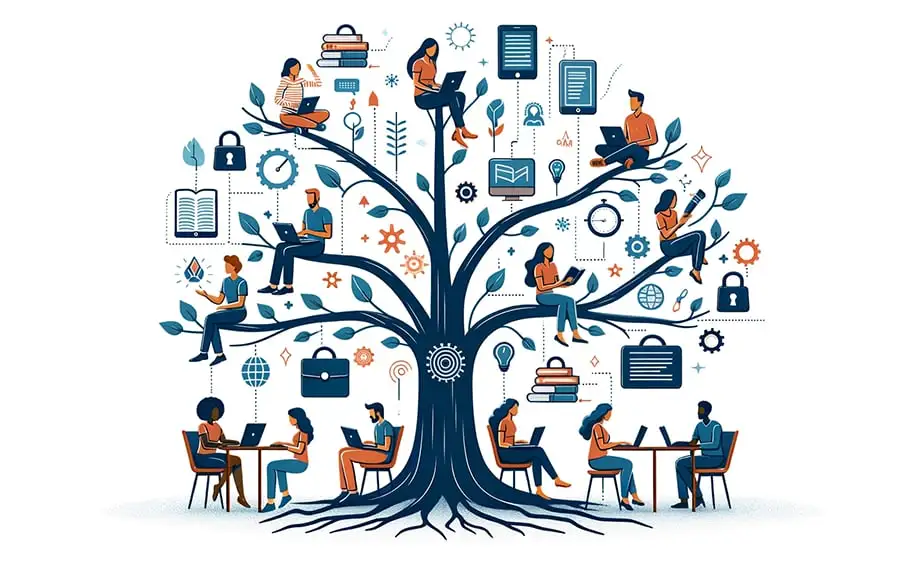The field of education is more vast and nuanced than we might initially think. Have you ever wondered why learning methods differ so significantly between children and adults? Today, we’ll uncover what is andragogy meaning, a concept that has transformed adult education.

Unraveling Andragogy
A knowledge time of discovery awaits us as we begin to unravel the mystery behind the andragogical meaning. From its origins to its essential principles, we’ll immerse ourselves in understanding this enlightening concept.
Andragogy Definition
The field of education is more vast and nuanced than we might initially think. Have you ever wondered why learning methods differ so significantly between children and adults? Today, we’ll uncover what is andragogy meaning, a concept that has transformed adult education.
What does andragogy mean?
- The term ‘andragogy’ comes from the Greek words ‘aner’ meaning man, and ‘agogus’ meaning leader.
- In essence, andragogy is a theory and practice that helps adults learn.
- Unlike pedagogy, which focuses on teaching children, andragogy puts adults at the center of the learning process.
- Andragogy emphasizes the importance of self-direction in learning, where adults take responsibility for their own learning journey.
- It highlights the role of experience as a rich resource for learning, acknowledging that adults bring a wealth of knowledge to the educational setting.
- The theory also focuses on practical, problem-solving approaches, recognizing that adults are typically motivated to learn by real-life challenges.
- Moreover, andragogy underscores the need for learning to be relevant and immediately applicable, as adults seek to apply new knowledge and skills directly to their personal and professional lives.
The Origin of Andragogy
The term andragogy was first used by Alexander Kapp, a German educator, in 1833. However, it was Malcolm Knowles, an American adult educator, who popularized it in the 1970s and gave us the theory of andragogy that we understand today.
The Theory of Andragogy
Having unraveled the foundation, let’s dive deeper into the core of the matter. We will explore the intricacies of andragogy, its underlying principles, and the andragogical process. Prepare for an intellectual adventure that will change your perception of adult learning.

Principles of Andragogy
Knowles presented five assumptions that form the core of andragogy.
- Self-Concept: As individuals mature, they move from being dependent to self-directed learners.
- Experience: Adults bring a rich reservoir of experiences, which serve as a resource for learning.
- Readiness to Learn: Adults become ready to learn the things they need to cope effectively with life situations.
- Orientation to Learning: Adults are problem-centered in their learning and are interested in immediate application of knowledge.
- Motivation: Adults are motivated to learn by internal factors rather than external ones.
Understanding Andragogical Process
Understanding andragogy in teaching means understanding its process. It begins with identifying the need to know, formulating learning objectives, identifying resources, choosing and implementing learning strategies, and finally, evaluating the learning outcomes. When discussing andragogy meaning, it is essential to recognize these steps to effectively cater to adult learners.
Andragogy in Practice
A theory is only as good as its application. In this part of our exploration, we will look at andragogy in action. Let’s investigate how it translates to the educational and teaching environments and understand its tangible impacts on adult learning.
- Professional Development Workshops: Companies often use andragogical principles in training sessions where employees are encouraged to share their experiences and apply new skills directly to their work. This approach ensures the training is relevant and immediately applicable.
- University Courses for Adults: Many universities design courses specifically for adult learners, incorporating flexible schedules, practical assignments, and opportunities for self-directed projects. These courses recognize the diverse backgrounds and experiences that adult students bring to the classroom.
- Online Learning Platforms: Online platforms like Coursera and LinkedIn Learning use andragogical methods by offering courses that adults can take at their own pace, focusing on topics that are directly relevant to their careers or personal interests. The platforms often include practical exercises and real-world projects.
- Community Education Programs: Local community centers might offer classes in areas such as technology, finance, or health, where the content is tailored to the needs and interests of adult learners. These programs often encourage peer-to-peer learning and practical application of skills.
- Corporate Training Programs: Many businesses implement andragogical strategies in their in-house training programs, focusing on problem-solving and hands-on learning to enhance employee skills and productivity. This can include mentorship programs where experienced employees guide new hires through practical challenges.
By examining these examples, we can see how andragogy meaningfully influences the way adults learn, making education a more engaging, relevant, and effective experience.
Andragogy in Education
The andragogical approach treats adult learners as unique individuals who are self-directed and experienced. It recognizes their need to apply learning practically and immediately, valuing their autonomy and experiences. For example, a training session might allow participants to choose projects that reflect their current workplace challenges, fostering a learning environment that adapts to individual professional requirements and respects their ability to direct their own learning journey. This method encourages a flexible, learner-centered atmosphere that deeply engages adults by addressing their specific, immediate needs.
Andragogy in Teaching
In an andragogical setting, the role of the teacher shifts significantly, focusing on facilitating learning rather than merely transmitting knowledge. This involves several key strategies:
- Creating an Environment for Self-Directed Learning: The teacher cultivates a space where adults can guide their own learning journey.
- Incorporating Real-Life Tasks: Lessons are designed around practical, real-world tasks to enhance learning relevance and application.
- Using the Learner’s Experience as a Resource: Teachers leverage the rich experiences of adult learners as a valuable resource in the learning process.

The Power of Andragogy
Having understood the essence and practical applications of andragogy, it’s time to uncover its transformative power. From the benefits it brings to the challenges it encounters, we will delve into an honest assessment of its effectiveness. Prepare to discover the compelling forces that make andragogy the secret to successful adult learning.
Benefits of Andragogy
Andragogy has the power to transform learning experiences by:
- Empowering adults: With its learner-centered approach, andragogy allows adults to take charge of their learning.
- Making learning relevant: By addressing real-life problems, andragogy ensures that learning is immediately applicable.
- Leveraging experience: The wealth of experience that adults bring to the table can be used to enrich the learning process.
Challenges of Andragogy
However, like any other theory, andragogy is not without challenges. Its effectiveness depends heavily on the learner’s level of self-directness and life experiences. Moreover, its applicability may be limited in certain learning situations, like learning new languages or complex scientific concepts, where a pedagogical approach might be more effective.
The Future of Andragogy

The future of andragogy looks promising. With the increasing shift towards lifelong learning and the digital revolution making self-directed learning easier, andragogy is set to become even more critical. From workplace training to higher education and even self-help, andragogy’s principles will continue to inform and improve how adults learn.


